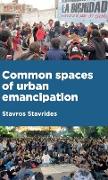Common Spaces of Urban Emancipation
BücherAngebote / Angebote:
With intense commitment and creative scholarship, Stavrides provides us with concrete experiences of how urban solidarity exists and can constitute the basis of emancipatory societies. In engagements with popular movements in Brazil, Mexico, Argentina, and Spain, and through the potentialities inherent in composing spaces of residence and work, commoning is demonstrated to be an incisive practice of reaching out to the larger world and creating a more dynamic and just public realm.'
AbdouMaliq Simone, Senior Professorial Fellow at the Urban Institute at the University of Sheffield, Research Associate at the Max Planck Institute for the Study of Religious and Ethnic Diversity and Visiting Professor of Sociology at Goldsmiths College, University of London
'Exciting stuff. Forget the state, think cities, think shared spaces of living and interacting, potential and present emancipation. Spaces that challenge enclosure, spaces that cross thresholds, open out. Think space as potential and follow it into self-organized neighborhoods, into architecture, into Zapatista communities, into urban and rural territories in resistance. Stimulating, full of detailed studies, great.'
John Holloway, Professor of Sociology at the Instituto de Ciencias Sociales y humanidades in the Benemérita Universidad Autónoma de Puebla, Mexico
Common spaces of urban emancipation explores contemporary urban experiences and how they are connected to practices of sharing and collaboration. It analyses the cultural meaning and politics of common spaces, alongside ideas of neighborhood, community, justice, and resistance, in order to trace elements of a different, emancipatory future.
Adding to growing debates around urban commons, Stavrides uses examples from Europe and Latin America to support the view that a world of mutual support and urban solidarity is emerging within, against, and beyond existing structures of inequality.
Focusing on concrete examples and interviews with people directly involved, from everyday neighbourhood organizing to dissident artistic practice, the book offers a new theoretical and political argument. In so doing, it demonstrates the clear emancipatory potential of space commoning.
Folgt in ca. 15 Arbeitstagen




